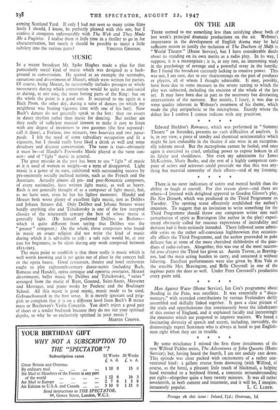ON THE AIR
THERE seemed to me something less than satisfying about both of last week's principal dramatic productions on the air. Webster's importance in the development of English drama may be held sufficient reason to justify the inclusion of The Duchess of Malfi in " World Theatre " (Home Service), but I have considerable doubt about its standing on its own merits as a radio play. In its way, I suppose, it is a masterpiece ; it is, at any rate, an interesting study in the psychology of revenge and a powerful essay in. the horrific. But I found the broadcast curiously lacking in emotive power. This was not, I am sure, due to any shortcomings on the part of producer or players, all of whom I thought admirable. It may, possibly, have been due in some measure to the severe cutting to which the play was subjected, including the excision of the whole of The last act. It may have been due in part to the necessary but distracting interventions of the narrator. But mainly, I fancy, it was due to some quality inherent in Webster's treatment of his theme, which made the play antipathetic to the microphone. Exactly where the defect lies I confess I cannot indicate with any precision.
Edward Sheldon's Romance, which was performed in " Summer Theatre " on Saturday, presents no such difficulties of analysis. It is, in my view, a piece of tawdry and theatrical sentimentality which might be just endurable in the theatre if one were in an exception- ally tolerant mood. But the microphone cannot be fooled, and once again it exercised its cruel, unfailing power to expose hokum in all its falsity and shoddiness. Not even my admiration for James McKechnie, Marie Burke, and the rest of a highly competent com- pany of actors and actresses could persuade me that this was any- thing but material unworthy of their efforts—and of my listening.
* *
There is no surer indication of sanity and mental health than the ability to laugh at oneself. For this reason alone—and there are others—I listened with delighted approval to Gordon Glover's -play, Do Not Disturb, which was produced in the Third Programme on Tuesday. The opening scene effectively established the author's intention. To suggest that an invitation to write something for the Third Programme should throw any competent writer into such perturbation of spirit as Bravington (the author in the play) experi- enced obviously called for raucous expressions of incredulity and derision had it been seriously intended. There followed some admir- able satire on the rather self-conscious highbrowism that occasion- ally afflicts the Third Programme, and the author proceeded to poke delicate fun at some of the more cherished shibboleths of the guar- dians of radio culture. Altogether, this was one of the most success- ful jeux d'esprit the Third has given us. Austin Trevor, as Braving- ton, had the main acting burden to carry, and sustained it without faltering. Excellent performances were also given by Rita Vale as the sensible Mrs. Bravington, and Belle Chrystall in one of the ingenue parts she does so well. Under Peter Cresswell's production every point told.
* * * *
Men Against Water (Home Service), Ian Cox's programme about flooding in the Fens, was excellent. It was essentially a " docu- mentary," with recorded contributions by various Fenlanders deftly assembled and skilfully linked together. It gave a clear picture of the trials and apprehensions that continuously beset the inhabitants of this corner of England, and it explained lucidly and interestingly the measures which are proposed to improve matters. We heard a fascinating diversity of speech and accent, including, inevitably, the distressingly expert Scotsman who is always at hand to put English- men right when they are in trouble.
* * * *
By some mischance I missed the first three instalments of the new Wilfred Pickles series, The Adventures of john Quixote (Home Service); but, having heard the fourth, I am not unduly cast down. This episode was close packed with excitements of a rather con- ventional kind: a gallant rescue from drowning (with Wilfred, of course, as the hero), a pleasant little touch of blackmail, a helping hand extended to a boyhood friend, a romantic misunderstanding put right—altogether quite a busy twenty minutes. It was all rather novelettish, in both content and treatment, and it will be, I imagine,


































 Previous page
Previous page